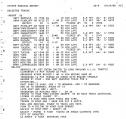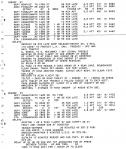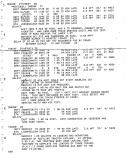
| Home | Open Account | Help | 333 users online |
|
Member Login
Discussion
Media SharingHostingLibrarySite Info |
Railroaders' Nostalgia > Career Maker or Breaker - SP System Morning ReportDate: 06/26/16 12:50 Career Maker or Breaker - SP System Morning Report Author: TexBob The info on this document played a big role in your career prospects as an officer on the SP.
If you could "make the trains run on time", you had a much better chance of moving up the ladder than colleagues that couldn't. Actually you didn't have to make these hot trains run on time as much as you didn't want them to fall down on your watch or territory. Frailey's BSM book talks about Krebs' career getting a major boost by his ability to make things happen with these trains early in his career. Any BSMFF / MBSMFF stories out there? Robert Pierce Sugar Land, TX SWRails.com    Date: 06/26/16 13:10 Re: Career Maker or Breaker - SP System Morning Report Author: TexBob Lots of interesting info in this type of report.
Note the MBSMF-26 at the beginning of the report. It arrived at 0122 at PB. It set out 34/0 and picked up 54/0. It departed PB at 0205, 43 minutes to do the work, crew change, air test, etc. Is that level of efficiency possible anywhere any more? It arrived SA at 1630. 50/1 s/o & 75/1 p/u, departing at 1710. 40 minutes to do the work! EP - 16/0 set out, no p/u in 20 minutes! Say what you want about the SP, but they could make stuff happen when they needed to. Of course this level of speed in terminals was possible only because of a lot of planning and coordination. Again, Frailey's book talks about this in detail. Lastly, the question of whether the SP made any money on the BSM's. Yes, there was an extra charge to ship on these trains, but was it enough to cover all of the extra costs? Robert Pierce Sugar Land, TX SWRails.com Date: 06/26/16 13:18 Re: Career Maker or Breaker - SP System Morning Report Author: WAF Thed BSM lost its glory when DJR retired in 1972. Example was the lenghting of its schedule to make LA on time which meant departing ESL 4 hours early in 1977. Delays like this under DJR would fry anyone's career. By BFB, it didn't matter as the BSM was late very day due to trackwork in TX and the volume of trains running against it. Under Staggers in 1980, it was low rates that got the business, not speed
Date: 06/26/16 23:16 Re: Career Maker or Breaker - SP System Morning Report Author: JGFuller When at Armourdale, the BSM certainly was hot - as it had Gemco parts off MILW 226. 0900 departure - see no failure.
I've seen other instances of what appeared to be very quick s/o and p/u - like the cited MBSM at Pine Bluff. Typically the train was consisted to set out its entire train, then re-consisted with the same cars, plus a fill, with all shown to s/o [in this instance] at SA - where the consisting process was repeated. Trust me, the MBSM did not do all that p/u and s/o enroute!. So the actual work done was probably just the pickup. From a management survival statnpoint, keeping the terminal fluid was just as important. and as difficult. Most terminal officers didn't rise too far above the level of Terminal Supt., as SP tended to preference 'road' managers. There's a reason the job was entitled "Terminal" ! Edited 2 time(s). Last edit at 06/26/16 23:25 by JGFuller. Date: 06/26/16 23:49 Re: Career Maker or Breaker - SP System Morning Report Author: trainjunkie TexBob Wrote:
------------------------------------------------------- > Is that level of efficiency possible anywhere any > more? Not with 2-man crews, no rear-end crews on cabooses, legal air tests (unless, maybe, if the PU was block tested in advance), and modern train lengths and car placement mandates. Date: 07/01/16 08:45 Re: Career Maker or Breaker - SP System Morning Report Author: PatternOfFailure trainjunkie Wrote:
------------------------------------------------------- > TexBob Wrote: > -------------------------------------------------- > ----- > > Is that level of efficiency possible anywhere > any > > more? > > Not with 2-man crews, no rear-end crews on > cabooses, legal air tests (unless, maybe, if the > PU was block tested in advance), and modern train > lengths and car placement mandates. Efficiency is not the same as productivity. Productivity is getting work done (which is what the time comparisions show); Efficiency is a measure of what equipment/men/facilities were required to do it. Date: 07/02/16 16:16 Re: Career Maker or Breaker - SP System Morning Report Author: 3rdswitch I too noticed the old timers getting work done in no time, today with combination of new rails and new rules impossible. Add one to rear add one to head end, ten minutes! No way today. Very interesting reading.
JB Date: 07/03/16 14:03 Re: Career Maker or Breaker - SP System Morning Report Author: ln844south Used to work local between Pensacola, Fl and Chattahoochee. Fl. 161 miles 18 stops and not tie up in 12 hours. IT was a "Blow and Go" method and a good crew could get it done and do it safely and not tear something up or get hurt..
Work that away now a days and you would be fired!! Steve Panzik retired Engineer Chiloquin, Or Date: 07/03/16 18:08 Re: Career Maker or Breaker - SP System Morning Report Author: JGFuller If it takes hiballing the air test to make a run in 12 hours, then the work is not structured properly. One need only witness one collision caused by an improper air test to realize its folly.
Date: 07/04/16 18:58 My important responsibility with the BSM Author: jbwest When I was first promoted to (acting) assistant trainmaster I was sent to Hearne, Texas, a crew change point for the BSM. Numa Bulot, the Trainmaster, didn't quite know what to make of this wet behind the ears MBA who came out of engine service, so he assigned me a critical job, stand by the headend as it stopped to change crews with my railroad watch, and try to ensure the wheels were not stopped for more than 60 seconds. I'm not too sure what I supposed to do, but the crews were good so I was quite successful in that assignment. Which undoubtedly accelerated my career. I can remember two other things about the BSM, the special instructions provided that only assistant superintendents and higher were authorized to do speed tests on it, and one time between Hearne and Flatonia, operating with manual block authority, we were going really really fast. Those were good days on the old SP, even if we were loosing our shirt.
Speaking of morning reports, some years later I worked for Joe Willis, the General Superintendent of Transportation. He was the one who gave the morning reports to first Russell and the BFB, as well as anyone else who could squeeze into his office. Yes, that was where a lot of reputations were made or broken. The morning phone calls were legendary. Because so many people tried to squeeze in for those reports, he literally had a bigger office than anyone else including the Chairman. The circus started around 6 a.m. Anyone who got to work later than 7 a.m. was a slacker. It was an interesting place to work. Yes, as Jack said, being a terminal superintendent was one of more thankless jobs on the railroad, those morning phone calls ended many a promising career. JBWX Edited 2 time(s). Last edit at 07/04/16 19:10 by jbwest. Date: 07/05/16 08:29 Re: My important responsibility with the BSM Author: WAF A bad overnight or 24 hours must have made it feel like a cell block
Date: 09/04/16 12:21 Re: My important responsibility with the BSM Author: BurtNorton I had a Supt. by the name of Thomas Lischer. Sometimes he was a reasonable guy, sometimes not with unrealistic expectations. His removal of manager's days off and the use of an 11 day on, 2 day off schedule were legendary. This was in 2009-2010 when UP was finding convenient ways of reducing its ranks through burn-out. Many a good manager left UP under his reign on the Utah Service Unit. Needless to say, those who are inept tend to get promoted at UP and there was no finer an example than him.
|